【2015中考复习方案】(人教版·包头)2015届九年级英语复习课件(自学反馈+重点突破):第10课时 Units 1—2[八年级下册](共39张PPT)
文档属性
| 名称 | 【2015中考复习方案】(人教版·包头)2015届九年级英语复习课件(自学反馈+重点突破):第10课时 Units 1—2[八年级下册](共39张PPT) | 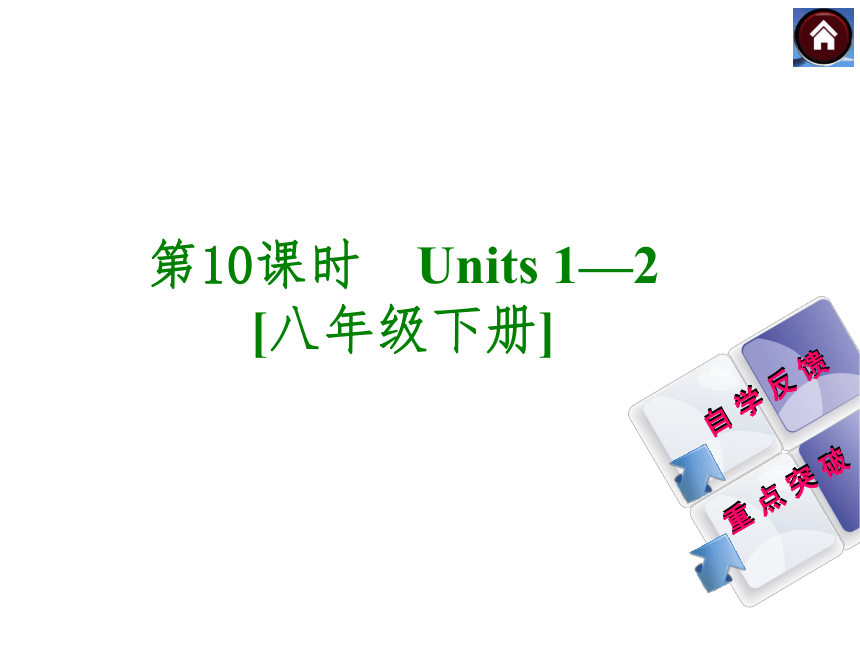 | |
| 格式 | zip | ||
| 文件大小 | 219.4KB | ||
| 资源类型 | 教案 | ||
| 版本资源 | 通用版 | ||
| 科目 | 英语 | ||
| 更新时间 | 2015-01-17 15:42:28 | ||
图片预览

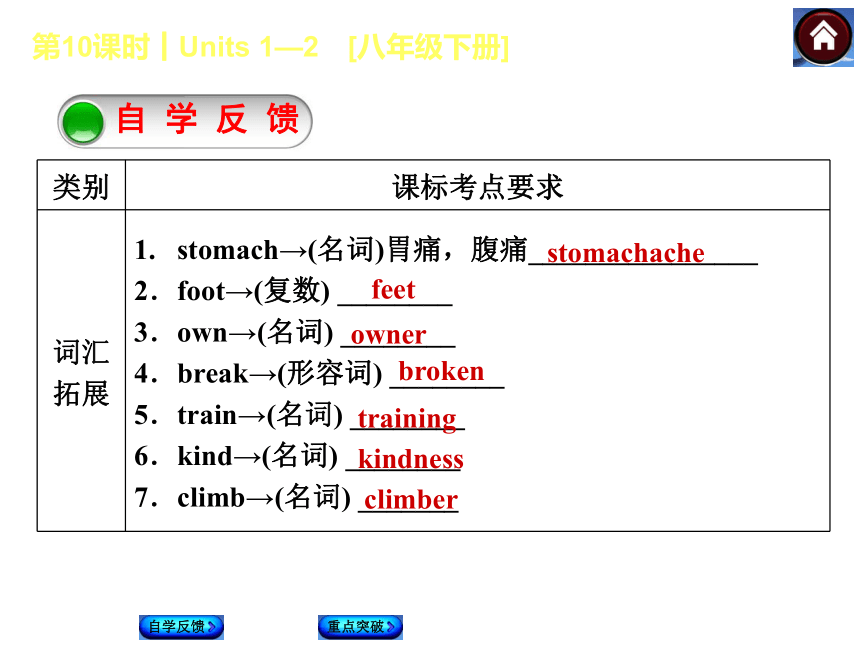
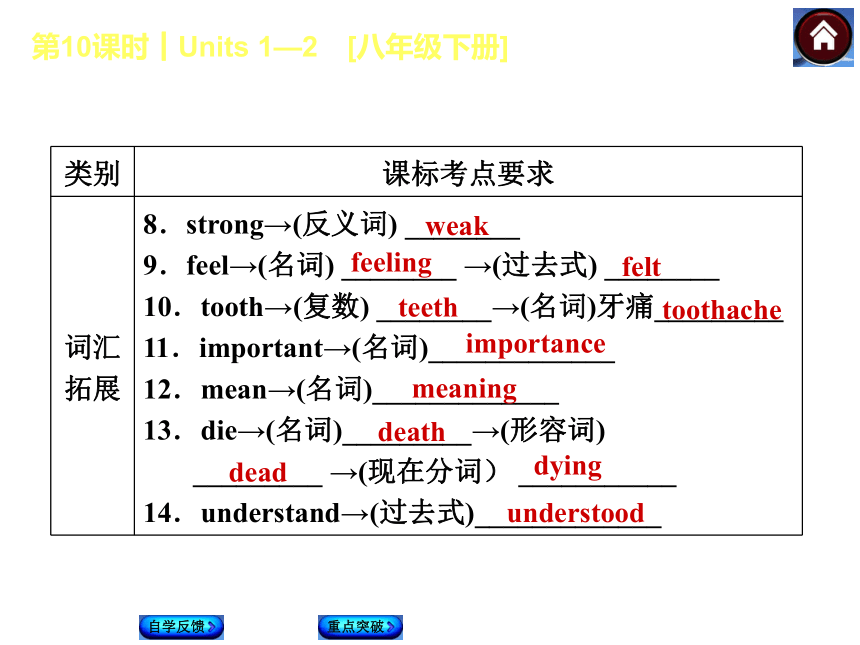
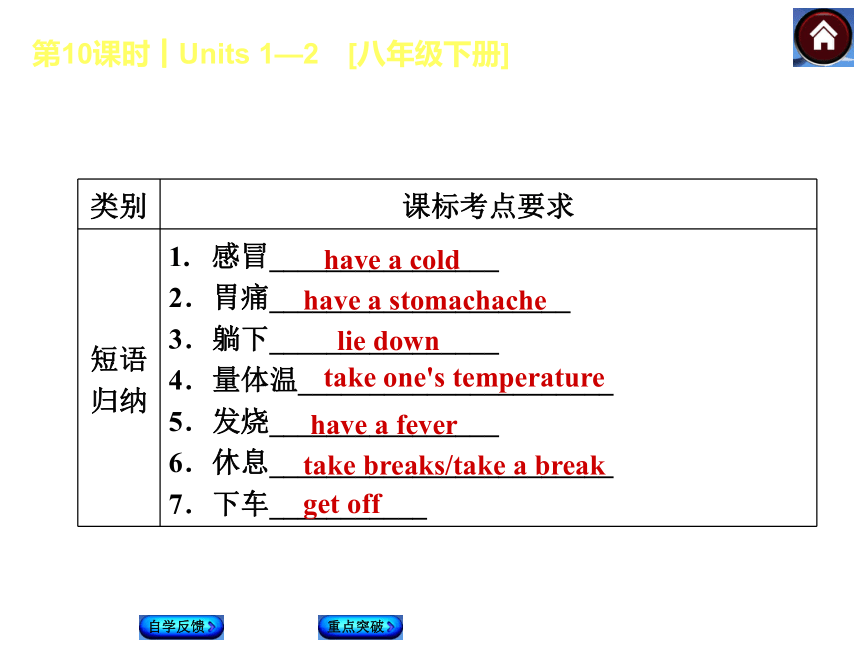
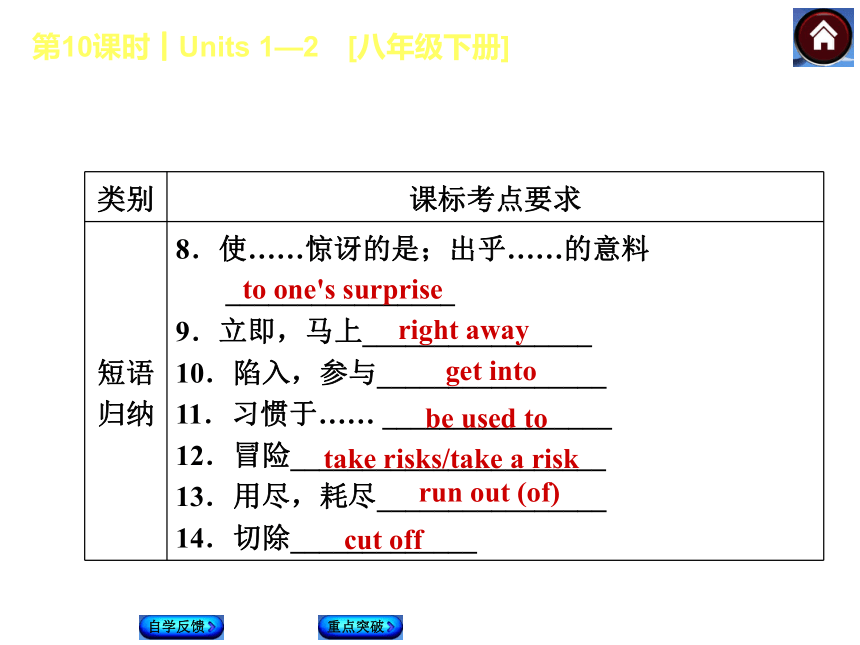
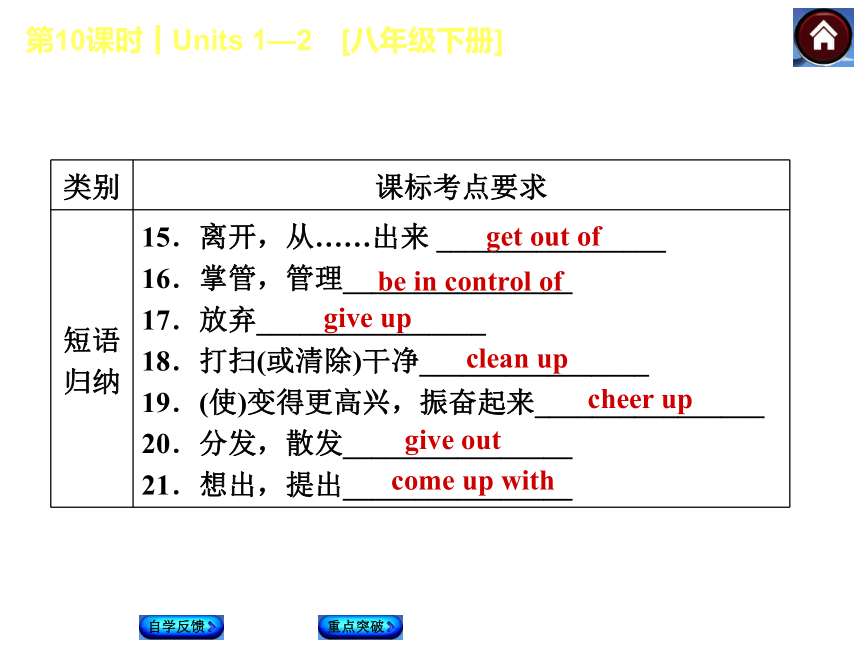
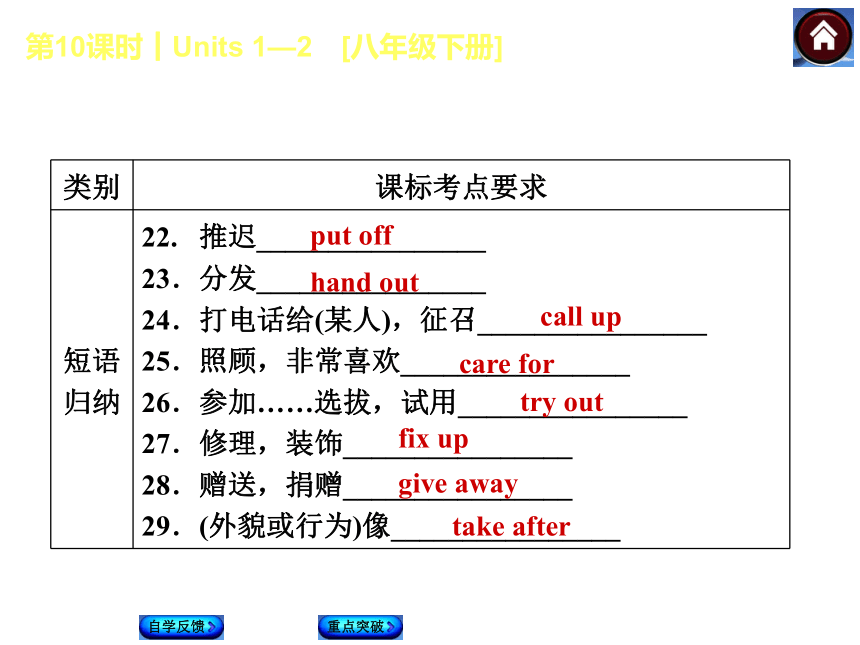
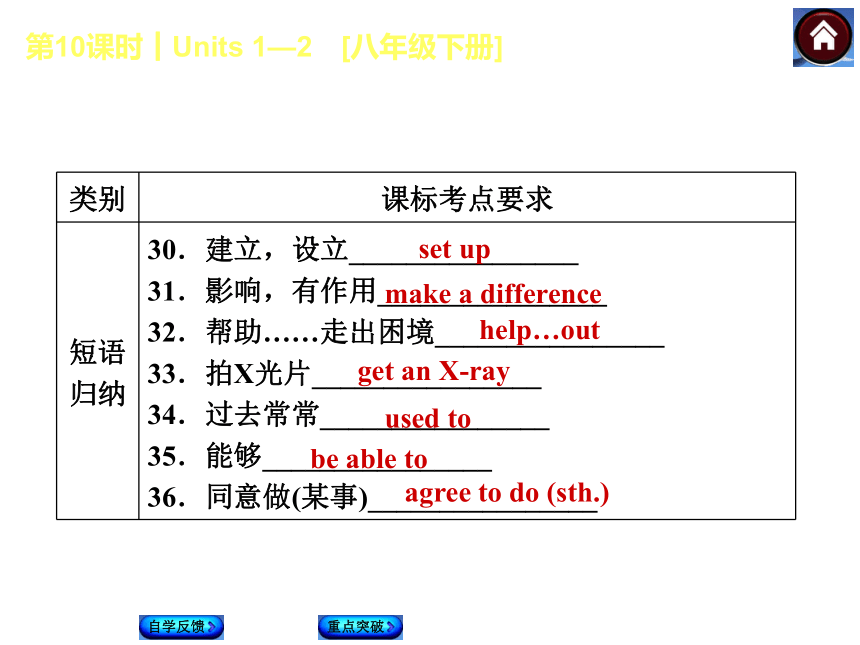
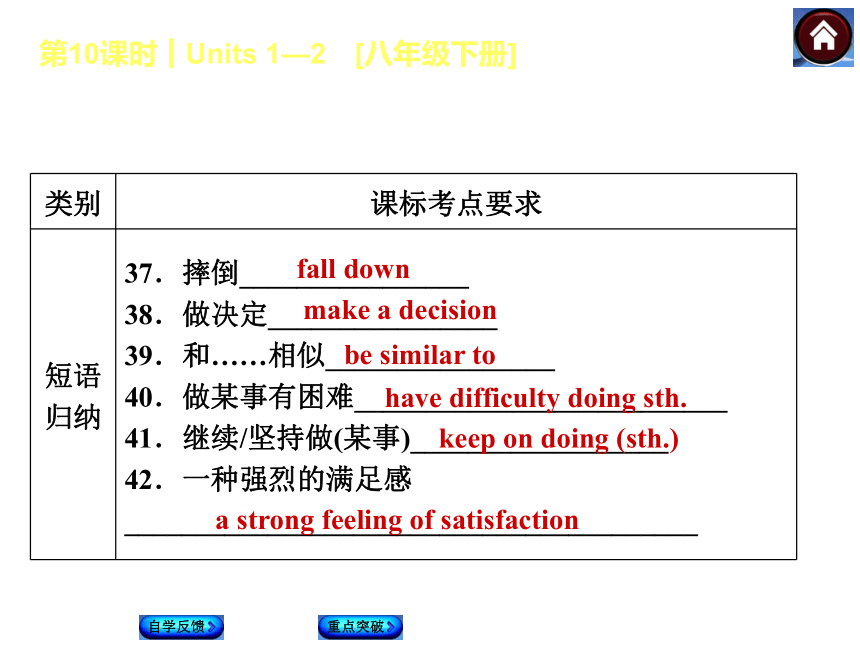
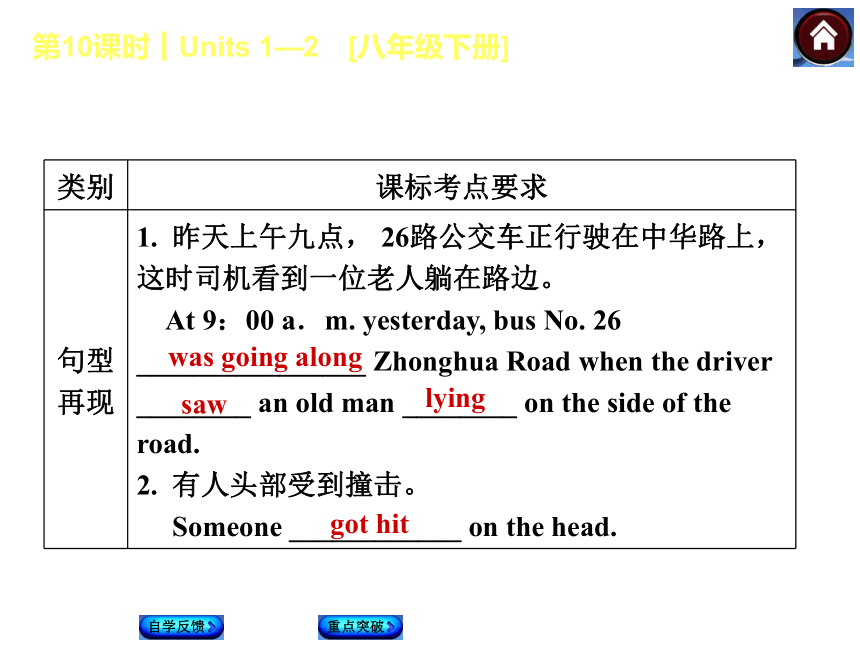

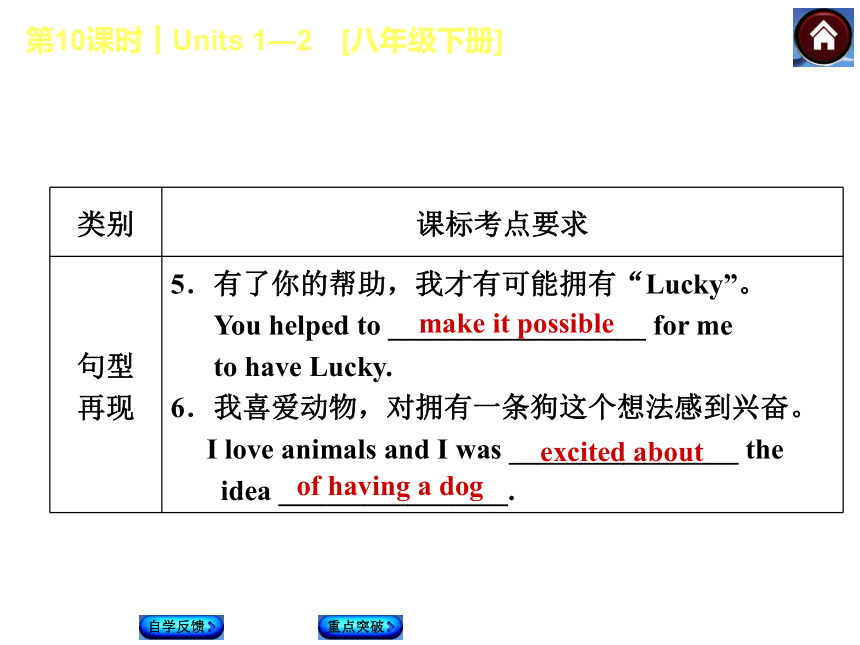
文档简介
课件39张PPT。第10课时 Units 1—2
[八年级下册] 第10课时┃Units 1—2 [八年级下册]自 学 反 馈自学反馈重点突破stomachache feet owner broken training kindness climber 第10课时┃Units 1—2 [八年级下册]weak feeling felt teeth toothache importance meaning death dead dying understood 自学反馈重点突破第10课时┃Units 1—2 [八年级下册]have a cold have a stomachache lie down take one's temperature have a fever take breaks/take a break get off 自学反馈重点突破第10课时┃Units 1—2 [八年级下册]to one's surprise right away get into be used to take risks/take a risk run out (of) cut off 自学反馈重点突破第10课时┃Units 1—2 [八年级下册]get out of be in control of give up clean up cheer up give out come up with 自学反馈重点突破第10课时┃Units 1—2 [八年级下册]put off hand out call up care for try out fix up give away take after 自学反馈重点突破第10课时┃Units 1—2 [八年级下册]set up make a difference help…out get an X-ray used to be able to agree to do (sth.) 自学反馈重点突破第10课时┃Units 1—2 [八年级下册]fall down make a decision be similar to have difficulty doing sth.keep on doing (sth.) a strong feeling of satisfaction 自学反馈重点突破第10课时┃Units 1—2 [八年级下册]was going along saw lying got hit 自学反馈重点突破第10课时┃Units 1—2 [八年级下册]used to be by herself at the age of four 自学反馈重点突破第10课时┃Units 1—2 [八年级下册]make it possible excited about of having a dog 自学反馈重点突破第10课时┃Units 1—2 [八年级下册]自学反馈重点突破●1 lie v.躺,平躺
常见搭配
lie down 躺下 lie on躺在……上 lie in 躺在……里
[拓展] 其过去式为lay,过去分词为lain,现在分词为lying。
Go and lie down for a while. 去躺一会儿吧。
Snow was lying thick on the ground.
厚厚的积雪覆盖着大地。
Mike is lying comfortably in his sleeping bag.
迈克正舒服地躺在他的睡袋里。重 点 突 破词 汇 点 睛 第10课时┃Units 1—2 [八年级下册]自学反馈重点突破●2 rest v.& n. 放松,休息
[点拨] (1)rest既可作动词也可作名词,表示“休息,放松”,作动词时,相当于have a rest。
You're too tired. You need to rest for a while.
你太累了,需要休息一会儿。
(2)rest作名词时,还有“剩余部分”的意思,常与定冠词the连用。当the rest或“the rest of the +名词”作主语时,谓语动词的数要与the rest表示的名词在数上保持一致。
The rest of the water is Kate's.剩下的水是凯特的。
This e-mail is for me, and the rest of the e-mails are for you. 这封电子邮件是写给我的,其余的电子邮件是写给你的。第10课时┃Units 1—2 [八年级下册]自学反馈重点突破●3 give up放弃
[点拨] give up后接名词、代词或动名词作宾语。若接代词作宾语时,代词要放在give和up之间。
He gave up smoking last year.=He stopped smoking last year. 去年他戒了烟。第10课时┃Units 1—2 [八年级下册]自学反馈重点突破 [拓展] 后接动名词的动词短语:
look forward to doing sth.期待做某事;
be used to doing sth.习惯于做某事;
feel like doing sth.想做某事;
cannot help doing sth.忍不住做某事;
put off doing sth.推迟做某事
finish doing sth. 做完某事
consider doing sth. 考虑做某事
keep on doing sth. 继续/坚持做某事
enjoy doing sth.喜欢做某事第10课时┃Units 1—2 [八年级下册]自学反馈重点突破 [2014·山西] Many successful people have the same quality—they never ________ no matter what difficulties they've had.
A.give up B.stay up C.cheer up 中考典例 第10课时┃Units 1—2 [八年级下册]A 自学反馈重点突破●4 cheer v.欢呼,喝彩
[点拨] cheer up为“动词+副词”短语,其后跟代词作宾语时,代词要放在cheer与up之间。
Let's buy some flowers to cheer her up.
让我们买一些花使她高兴起来吧。
[拓展] cheerful adj.高兴的;快乐的
Hearing the news, all of us were cheerful.
听到这个消息,我们都兴高采烈。
[搭配] cheer up 使振奋;使高兴起来
They all cheered up when they heard the good news.当听到这个好消息时,他们都欢呼了起来。第10课时┃Units 1—2 [八年级下册]自学反馈重点突破 [2013·锦州] —He looks unhappy today.
—Let's ________.
A.cheer him up B.help out him
C.look him after D.argue with him中考典例 第10课时┃Units 1—2 [八年级下册]A 自学反馈重点突破●5 put off推迟
[点拨] put off为“动词+副词”短语,后接名词作宾语时放在off前后均可,若后接代词作宾语,代词则要放在put与off之间。类似用法的短语还有:
put out扑灭,熄灭(火) put on穿上
take off脱下 put up张贴
put away收起来 give out分发
cheer up使振奋 pick up捡起来
clean up(把……)打扫干净
[拓展] put off doing sth.意为“推迟做某事”。
He keeps putting off going to the dentist.
他把看牙医的事一拖再拖。第10课时┃Units 1—2 [八年级下册]自学反馈重点突破 [2014·安顺] Spring has come. We can't________ the plan. The trees must be planted this week.
A.put off B.make up
C.come up with D.look up中考典例 第10课时┃Units 1—2 [八年级下册]A 自学反馈重点突破●6 decision n.决心;抉择;决定
常考搭配
decide to do sth. 决定做某事
make a decision of doing sth. 决定做某事
make a decision to do sth. 决定做某事
Have they made a decision yet?
他们已经作出决定了吗?
We made a decision to go to Beijing next week.
=We made a decision of going to Beijing next week.我们决定下周去北京。第10课时┃Units 1—2 [八年级下册]自学反馈重点突破●1 alone/lonely
(1)alone可以作形容词或副词,意为“单独的(地);孤独的(地)”,相当于by oneself,表示客观情况。
She lives alone in the village.
她独自一人生活在那个村庄里。
He is alone in the house.
他独自一人在屋里。巧 辨 异 同 第10课时┃Units 1—2 [八年级下册]自学反馈重点突破 (2)lonely 只用作形容词, 带有感彩,形容因失去朋友、缺乏友爱和帮助而感到寂寞、甚至悲哀。
①作表语,意为“孤单的,孤独的”。
He feels lonely. 他感到孤独。
②作前置定语,修饰表示处所的名词,意为“荒凉的,偏僻的”。
The old man lives in a lonely mountain village.
这位老人住在一个偏僻的山村。
The old man lives alone, but he doesn't feel lonely.
这位老人独自生活,但他并不感到寂寞。第10课时┃Units 1—2 [八年级下册]自学反馈重点突破[2013·绥化] Though he is ________ at home, he doesn't feel________ for he has many things to do.
A.alone; lonely
B.lonely; alone
C.alone; alone 中考典例 第10课时┃Units 1—2 [八年级下册]A 自学反馈重点突破●2 much too/too much/too many 第10课时┃Units 1—2 [八年级下册]自学反馈重点突破1.单项选择
[2013·孝感] —Why are you so tired these days?
—Well, I have ________ homework to do.
A.too much B.too many
C.much too D.many too 中考典例 2.用too much, much too或too many填空
(1)We are______________ busy.
(2)Don't eat ___________ junk food.
(3)There are ___________ people in the street.第10课时┃Units 1—2 [八年级下册]A much tootoo much too many自学反馈重点突破●1 —What's the matter? 你怎么啦?
—I have a sore back. 我背痛。
[点拨] (1)What's the matter?=What's the trouble?=What's wrong? 怎么了?
如果表示“某人/物怎么了”,要在这几种形式后加上with sb./sth.。
What's the trouble/matter with you?
=What's wrong with you?你怎么了?
句 型 透 视 第10课时┃Units 1—2 [八年级下册]自学反馈重点突破 (2)“have+a+症状名词”表示具有某种“病症、症状”,有“患(病)”的意思,其中不定冠词a不可省略。
I have a headache and a cough.
我头疼而且咳嗽。第10课时┃Units 1—2 [八年级下册]自学反馈重点突破[2014·南昌] —Hi, John. ________?
—It's Lucy, my dog. Her leg is hurt.
A.How are you B.What's the matter
C.Who's that D.What's Lucy like中考典例 第10课时┃Units 1—2 [八年级下册]B自学反馈重点突破●2 They told me stories about the past and how things
used to be.他们给我讲过去的生活经历,讲过去是什么
样子的。
[句型] used to do sth. 表示“过去常常做某事”,指过去常常发生的动作或存在的状态,而现在不再做了。
He used to become angry. 他过去常常生气。第10课时┃Units 1—2 [八年级下册]自学反馈重点突破 [拓展] (1)used to do 的否定形式为“didn't use to do”或“used not to do”,used not可缩写为usedn't。
Mr. Li didn't use to drink beer.
=Mr. Li usedn't to drink beer.
李先生过去不常喝啤酒。
(2)used to do 的疑问句形式是“Did…use to do?”或“Used…to do?”
Did she use to get up early?
=Used she to get up early? 她过去经常早起吗?第10课时┃Units 1—2 [八年级下册]自学反馈重点突破 (3)used to 的反意疑问句由助动词did(n't)或used(n't)构成。
Mario used to be late for school, didn't/usedn't he?
马里奥以前上学经常迟到,不是吗?第10课时┃Units 1—2 [八年级下册]自学反馈重点突破 [拓展] (1)be used to doing sth. 表示“习惯于做某事”,to是介词,后跟名词、代词或动名词作宾语。
Amy is used to getting up early.艾米习惯早起。
(2)be used to do sth. =be used for doing sth.表示“被用来做某事”。
Knives are used to cut things.
=Knives are used for cutting things.
刀是用来切东西的。 第10课时┃Units 1—2 [八年级下册]自学反馈重点突破[2014·南充] She used to ________ a bus to school, but now she is used to ________ to school.
A.taking; walk B.take; walk
C.taking; walking D.take; walking中考典例 第10课时┃Units 1—2 [八年级下册]D自学反馈重点突破●3 You helped to make it possible for me to have Lucky.
有了你的帮助,我才有可能拥有“Lucky”。
[点拨] “make it+形容词+to do sth.”意为“使做某事……”,it在句中作形式宾语,形容词作宾语补足语,动词不定式是真正的宾语。能用于该句型的动词还有think, feel, find等。
Our teacher makes it interesting to learn English.
我们的老师使学英语变得有趣。第10课时┃Units 1—2 [八年级下册]自学反馈重点突破[2014·白银] Televisions have made________ possible for us to watch movies at home.
A.that B.this C.it D.they中考典例 第10课时┃Units 1—2 [八年级下册]C自学反馈重点突破●4 I love animals and I was excited about the idea of having a dog. 我喜爱动物,对拥有一条狗这个想法感到兴奋。
常考搭配
be excited about 对……感到兴奋
be excited to do sth.=be excited about doing sth.
对做某事感到兴奋
You must be excited about your new job.
你一定对你的新工作感到兴奋吧。
He is excited about surfing in the sea.
他对海上冲浪感到兴奋。第10课时┃Units 1—2 [八年级下册]自学反馈重点突破
[八年级下册] 第10课时┃Units 1—2 [八年级下册]自 学 反 馈自学反馈重点突破stomachache feet owner broken training kindness climber 第10课时┃Units 1—2 [八年级下册]weak feeling felt teeth toothache importance meaning death dead dying understood 自学反馈重点突破第10课时┃Units 1—2 [八年级下册]have a cold have a stomachache lie down take one's temperature have a fever take breaks/take a break get off 自学反馈重点突破第10课时┃Units 1—2 [八年级下册]to one's surprise right away get into be used to take risks/take a risk run out (of) cut off 自学反馈重点突破第10课时┃Units 1—2 [八年级下册]get out of be in control of give up clean up cheer up give out come up with 自学反馈重点突破第10课时┃Units 1—2 [八年级下册]put off hand out call up care for try out fix up give away take after 自学反馈重点突破第10课时┃Units 1—2 [八年级下册]set up make a difference help…out get an X-ray used to be able to agree to do (sth.) 自学反馈重点突破第10课时┃Units 1—2 [八年级下册]fall down make a decision be similar to have difficulty doing sth.keep on doing (sth.) a strong feeling of satisfaction 自学反馈重点突破第10课时┃Units 1—2 [八年级下册]was going along saw lying got hit 自学反馈重点突破第10课时┃Units 1—2 [八年级下册]used to be by herself at the age of four 自学反馈重点突破第10课时┃Units 1—2 [八年级下册]make it possible excited about of having a dog 自学反馈重点突破第10课时┃Units 1—2 [八年级下册]自学反馈重点突破●1 lie v.躺,平躺
常见搭配
lie down 躺下 lie on躺在……上 lie in 躺在……里
[拓展] 其过去式为lay,过去分词为lain,现在分词为lying。
Go and lie down for a while. 去躺一会儿吧。
Snow was lying thick on the ground.
厚厚的积雪覆盖着大地。
Mike is lying comfortably in his sleeping bag.
迈克正舒服地躺在他的睡袋里。重 点 突 破词 汇 点 睛 第10课时┃Units 1—2 [八年级下册]自学反馈重点突破●2 rest v.& n. 放松,休息
[点拨] (1)rest既可作动词也可作名词,表示“休息,放松”,作动词时,相当于have a rest。
You're too tired. You need to rest for a while.
你太累了,需要休息一会儿。
(2)rest作名词时,还有“剩余部分”的意思,常与定冠词the连用。当the rest或“the rest of the +名词”作主语时,谓语动词的数要与the rest表示的名词在数上保持一致。
The rest of the water is Kate's.剩下的水是凯特的。
This e-mail is for me, and the rest of the e-mails are for you. 这封电子邮件是写给我的,其余的电子邮件是写给你的。第10课时┃Units 1—2 [八年级下册]自学反馈重点突破●3 give up放弃
[点拨] give up后接名词、代词或动名词作宾语。若接代词作宾语时,代词要放在give和up之间。
He gave up smoking last year.=He stopped smoking last year. 去年他戒了烟。第10课时┃Units 1—2 [八年级下册]自学反馈重点突破 [拓展] 后接动名词的动词短语:
look forward to doing sth.期待做某事;
be used to doing sth.习惯于做某事;
feel like doing sth.想做某事;
cannot help doing sth.忍不住做某事;
put off doing sth.推迟做某事
finish doing sth. 做完某事
consider doing sth. 考虑做某事
keep on doing sth. 继续/坚持做某事
enjoy doing sth.喜欢做某事第10课时┃Units 1—2 [八年级下册]自学反馈重点突破 [2014·山西] Many successful people have the same quality—they never ________ no matter what difficulties they've had.
A.give up B.stay up C.cheer up 中考典例 第10课时┃Units 1—2 [八年级下册]A 自学反馈重点突破●4 cheer v.欢呼,喝彩
[点拨] cheer up为“动词+副词”短语,其后跟代词作宾语时,代词要放在cheer与up之间。
Let's buy some flowers to cheer her up.
让我们买一些花使她高兴起来吧。
[拓展] cheerful adj.高兴的;快乐的
Hearing the news, all of us were cheerful.
听到这个消息,我们都兴高采烈。
[搭配] cheer up 使振奋;使高兴起来
They all cheered up when they heard the good news.当听到这个好消息时,他们都欢呼了起来。第10课时┃Units 1—2 [八年级下册]自学反馈重点突破 [2013·锦州] —He looks unhappy today.
—Let's ________.
A.cheer him up B.help out him
C.look him after D.argue with him中考典例 第10课时┃Units 1—2 [八年级下册]A 自学反馈重点突破●5 put off推迟
[点拨] put off为“动词+副词”短语,后接名词作宾语时放在off前后均可,若后接代词作宾语,代词则要放在put与off之间。类似用法的短语还有:
put out扑灭,熄灭(火) put on穿上
take off脱下 put up张贴
put away收起来 give out分发
cheer up使振奋 pick up捡起来
clean up(把……)打扫干净
[拓展] put off doing sth.意为“推迟做某事”。
He keeps putting off going to the dentist.
他把看牙医的事一拖再拖。第10课时┃Units 1—2 [八年级下册]自学反馈重点突破 [2014·安顺] Spring has come. We can't________ the plan. The trees must be planted this week.
A.put off B.make up
C.come up with D.look up中考典例 第10课时┃Units 1—2 [八年级下册]A 自学反馈重点突破●6 decision n.决心;抉择;决定
常考搭配
decide to do sth. 决定做某事
make a decision of doing sth. 决定做某事
make a decision to do sth. 决定做某事
Have they made a decision yet?
他们已经作出决定了吗?
We made a decision to go to Beijing next week.
=We made a decision of going to Beijing next week.我们决定下周去北京。第10课时┃Units 1—2 [八年级下册]自学反馈重点突破●1 alone/lonely
(1)alone可以作形容词或副词,意为“单独的(地);孤独的(地)”,相当于by oneself,表示客观情况。
She lives alone in the village.
她独自一人生活在那个村庄里。
He is alone in the house.
他独自一人在屋里。巧 辨 异 同 第10课时┃Units 1—2 [八年级下册]自学反馈重点突破 (2)lonely 只用作形容词, 带有感彩,形容因失去朋友、缺乏友爱和帮助而感到寂寞、甚至悲哀。
①作表语,意为“孤单的,孤独的”。
He feels lonely. 他感到孤独。
②作前置定语,修饰表示处所的名词,意为“荒凉的,偏僻的”。
The old man lives in a lonely mountain village.
这位老人住在一个偏僻的山村。
The old man lives alone, but he doesn't feel lonely.
这位老人独自生活,但他并不感到寂寞。第10课时┃Units 1—2 [八年级下册]自学反馈重点突破[2013·绥化] Though he is ________ at home, he doesn't feel________ for he has many things to do.
A.alone; lonely
B.lonely; alone
C.alone; alone 中考典例 第10课时┃Units 1—2 [八年级下册]A 自学反馈重点突破●2 much too/too much/too many 第10课时┃Units 1—2 [八年级下册]自学反馈重点突破1.单项选择
[2013·孝感] —Why are you so tired these days?
—Well, I have ________ homework to do.
A.too much B.too many
C.much too D.many too 中考典例 2.用too much, much too或too many填空
(1)We are______________ busy.
(2)Don't eat ___________ junk food.
(3)There are ___________ people in the street.第10课时┃Units 1—2 [八年级下册]A much tootoo much too many自学反馈重点突破●1 —What's the matter? 你怎么啦?
—I have a sore back. 我背痛。
[点拨] (1)What's the matter?=What's the trouble?=What's wrong? 怎么了?
如果表示“某人/物怎么了”,要在这几种形式后加上with sb./sth.。
What's the trouble/matter with you?
=What's wrong with you?你怎么了?
句 型 透 视 第10课时┃Units 1—2 [八年级下册]自学反馈重点突破 (2)“have+a+症状名词”表示具有某种“病症、症状”,有“患(病)”的意思,其中不定冠词a不可省略。
I have a headache and a cough.
我头疼而且咳嗽。第10课时┃Units 1—2 [八年级下册]自学反馈重点突破[2014·南昌] —Hi, John. ________?
—It's Lucy, my dog. Her leg is hurt.
A.How are you B.What's the matter
C.Who's that D.What's Lucy like中考典例 第10课时┃Units 1—2 [八年级下册]B自学反馈重点突破●2 They told me stories about the past and how things
used to be.他们给我讲过去的生活经历,讲过去是什么
样子的。
[句型] used to do sth. 表示“过去常常做某事”,指过去常常发生的动作或存在的状态,而现在不再做了。
He used to become angry. 他过去常常生气。第10课时┃Units 1—2 [八年级下册]自学反馈重点突破 [拓展] (1)used to do 的否定形式为“didn't use to do”或“used not to do”,used not可缩写为usedn't。
Mr. Li didn't use to drink beer.
=Mr. Li usedn't to drink beer.
李先生过去不常喝啤酒。
(2)used to do 的疑问句形式是“Did…use to do?”或“Used…to do?”
Did she use to get up early?
=Used she to get up early? 她过去经常早起吗?第10课时┃Units 1—2 [八年级下册]自学反馈重点突破 (3)used to 的反意疑问句由助动词did(n't)或used(n't)构成。
Mario used to be late for school, didn't/usedn't he?
马里奥以前上学经常迟到,不是吗?第10课时┃Units 1—2 [八年级下册]自学反馈重点突破 [拓展] (1)be used to doing sth. 表示“习惯于做某事”,to是介词,后跟名词、代词或动名词作宾语。
Amy is used to getting up early.艾米习惯早起。
(2)be used to do sth. =be used for doing sth.表示“被用来做某事”。
Knives are used to cut things.
=Knives are used for cutting things.
刀是用来切东西的。 第10课时┃Units 1—2 [八年级下册]自学反馈重点突破[2014·南充] She used to ________ a bus to school, but now she is used to ________ to school.
A.taking; walk B.take; walk
C.taking; walking D.take; walking中考典例 第10课时┃Units 1—2 [八年级下册]D自学反馈重点突破●3 You helped to make it possible for me to have Lucky.
有了你的帮助,我才有可能拥有“Lucky”。
[点拨] “make it+形容词+to do sth.”意为“使做某事……”,it在句中作形式宾语,形容词作宾语补足语,动词不定式是真正的宾语。能用于该句型的动词还有think, feel, find等。
Our teacher makes it interesting to learn English.
我们的老师使学英语变得有趣。第10课时┃Units 1—2 [八年级下册]自学反馈重点突破[2014·白银] Televisions have made________ possible for us to watch movies at home.
A.that B.this C.it D.they中考典例 第10课时┃Units 1—2 [八年级下册]C自学反馈重点突破●4 I love animals and I was excited about the idea of having a dog. 我喜爱动物,对拥有一条狗这个想法感到兴奋。
常考搭配
be excited about 对……感到兴奋
be excited to do sth.=be excited about doing sth.
对做某事感到兴奋
You must be excited about your new job.
你一定对你的新工作感到兴奋吧。
He is excited about surfing in the sea.
他对海上冲浪感到兴奋。第10课时┃Units 1—2 [八年级下册]自学反馈重点突破
